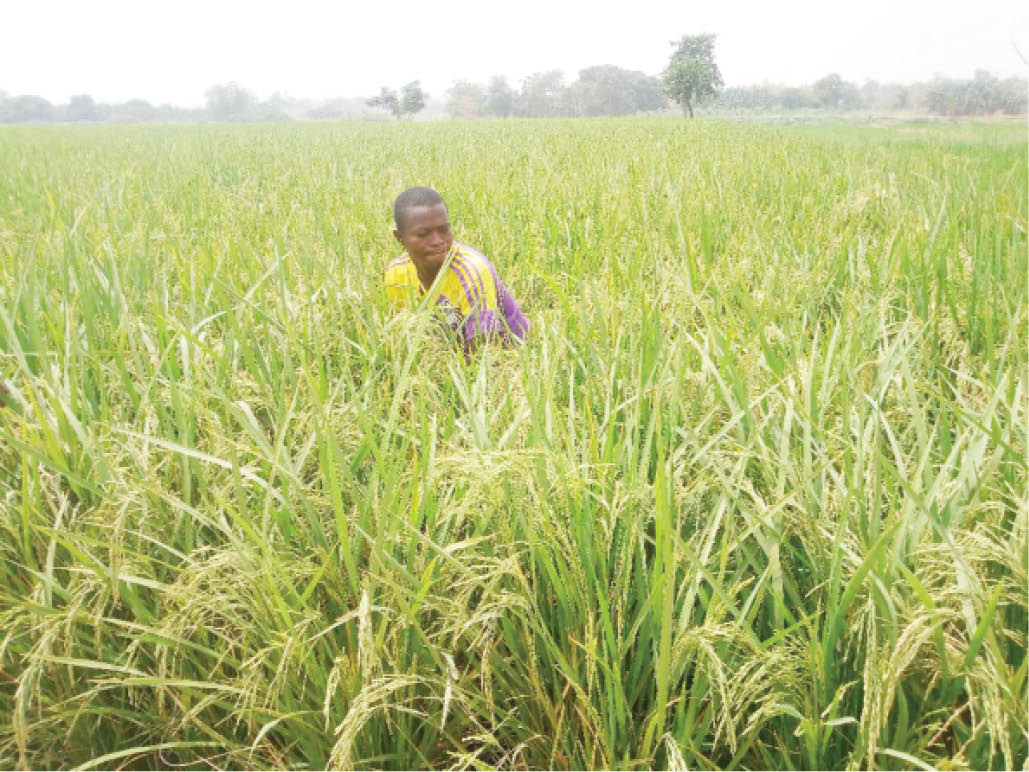How ‘Boko Haram’ grass threatens Kwara rice communities
Farmers running out of land for cassava Rice farmers in Lafiagi, a rice producing community in Kwara State have raised alarm over the growth of a grass variety that is threatening rice production in the area. Our reporter, who visited Lafiagi and some surrounding villages, recently, reports that the grass, suspected to be typha grass, […]

- Farmers running out of land for cassava
Rice farmers in Lafiagi, a rice producing community in Kwara State have raised alarm over the growth of a grass variety that is threatening rice production in the area.
Our reporter, who visited Lafiagi and some surrounding villages, recently, reports that the grass, suspected to be typha grass, was nicknamed ‘Boko Haram’ grass because of its destructive nature.
A group of rice farmers, who took Daily Trust to some of the farms, lamented that several appeals for solution from relevant authorities over the destructive grass have not yielded any positive result.
Malam Idris Abdullahi Baba, who spoke on behalf of the group, said the havoc caused by the grass was first recorded by wet season rice farmers.
Dry season farmer have also started to experience the attack.
He said the deadly grass attacked the crop during flowering and subsequently destroyed the plants completely.
“The grass looks like rice itself. You can hardly differentiate; we have not seen such in our area before,’’ he said.
Malam Abdullahi said the farmers later suspected that the grass was transferred to the area by migrating herdsmen through their animals.
He said he lost almost all of his two hectare farmland to the grass in the last wet season.
Another farmer, Musa Bologi, said he was able to get only two 50kg bags of paddy from a rice farm close to a hectare in size, adding that the strange grass destroyed the rice farm completely.
Some other farmers told Daily Trust that if relevant pesticides were not made available before the commencement of the wet season, many people may be discouraged from rice farming next year.
“All our effort last year was thwarted by the attack by the grass as well as the floods that washed away some of our farms. We are appealing to the state Ministry of Agriculture, the Central Bank and other stakeholders to come to our aid,’’ another rice farmer, Abdullahi A. Abdullahi, pleaded.
An agric extension officer in the community, who craved anonymity because the civil service rules do not permit him to speak to the press, confirmed the existence of the grass but advised farmers to always weed their farms on time so that the grass will not grow.
He said because the grass grows alongside the rice, it will be difficult to apply pesticides without affecting the rice, which, he noted, by then, will be flowering.
Community running out of land for cassava
Meanwhile, cassava farmers in the community have also raised an alarm over the scarcity of land to caltivate the tuber crop.
Abdullahi Sambo, a renowned cassava farmer in Lafiagi, told Daily Trust that getting land for cassava farming in the community was now a problem, forcing many to abandon the crop.
“Some people who have passion for cassava now go outside the local government to seek land. We don’t have land for cassava again and it is painful as in the nearest future, this may lead to the high cost of garri and cassava flour,’’ he said.
Sambo attributed the new rush into cassava farming in the area to government’s increased interest in the agriculture sector.
But despite the claims by the cassava farmers in the area, Daily Trust’s market survey showed a great reduction in the prices of yam flour and garri in the area.
A small measure of cassava flour previously sold for between N40 and N50 now sells for between N20 and N25 while a 50kg bag of garri previously sold at N4,000 has crashed to N3,000 in most of the local markets in the community.
